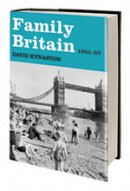A weekly roundup of noteworthy reviews from other sources.
 Benjamin Schwarz was an outspoken fan of David Kynaston’s Austerity Britain, the first book in a project called Tales of a New Jerusalem, which uses primary sources to tell the story of Britain from 1945 to 1979. Now, Schwarz reviews the second volume, Family Britain: “Kynaston has again written a masterpiece. More vividly and profoundly than any other historical work I’ve read, Tales of a New Jerusalem captures the rhythms and texture of everyday life and the collective experience of a nation. At once fine-grained and panoramic, witty and plangent, the books masterfully shift focus from deliberations in Whitehall to gossip in the back garden, from sweeping social changes to the hilarious but sad routine—the misguided attempts to please, the self-effacing apologies, the miscues—of a Cheshire family’s teatime.” He also spends a majority of the review writing about a new documentary film, Of Time and the City, which depicts Liverpool during the same time period. . . . Saul Austerlitz reviews a book about Vincente Minnelli, Mr. Judy Garland and a director with more feeling for furniture than people. (“At times, the sets took precedence over the actors; one wag dismissed his 1955 psychiatric drama The Cobweb as The Drapes of Wrath.”) . . . A new book charts the history of the punch line that doubled as a car: the Yugo. . . . The Wall Street Journal reviews three news books about troubled marriages and the different ways people try to fix (or end) them. . . . Eric Ormsby says that Holy Warriors by Jonathan Phillips has “a cool, almost documentary power” and is “the best recent history of the Crusades.” . . . The Times (London) judges that Alex Butterworth’s new book is “exhausting” and “perhaps more dizzying than it needs to be,” but worthwhile nonetheless: “[I]n this rich and passionate account of the world’s first international terrorist campaign — as conducted by anarchist zealots between the Paris Commune of 1871 and the first Russian Revolution of 1905 — the disquieting echoes of our own times are impossible to ignore.”
Benjamin Schwarz was an outspoken fan of David Kynaston’s Austerity Britain, the first book in a project called Tales of a New Jerusalem, which uses primary sources to tell the story of Britain from 1945 to 1979. Now, Schwarz reviews the second volume, Family Britain: “Kynaston has again written a masterpiece. More vividly and profoundly than any other historical work I’ve read, Tales of a New Jerusalem captures the rhythms and texture of everyday life and the collective experience of a nation. At once fine-grained and panoramic, witty and plangent, the books masterfully shift focus from deliberations in Whitehall to gossip in the back garden, from sweeping social changes to the hilarious but sad routine—the misguided attempts to please, the self-effacing apologies, the miscues—of a Cheshire family’s teatime.” He also spends a majority of the review writing about a new documentary film, Of Time and the City, which depicts Liverpool during the same time period. . . . Saul Austerlitz reviews a book about Vincente Minnelli, Mr. Judy Garland and a director with more feeling for furniture than people. (“At times, the sets took precedence over the actors; one wag dismissed his 1955 psychiatric drama The Cobweb as The Drapes of Wrath.”) . . . A new book charts the history of the punch line that doubled as a car: the Yugo. . . . The Wall Street Journal reviews three news books about troubled marriages and the different ways people try to fix (or end) them. . . . Eric Ormsby says that Holy Warriors by Jonathan Phillips has “a cool, almost documentary power” and is “the best recent history of the Crusades.” . . . The Times (London) judges that Alex Butterworth’s new book is “exhausting” and “perhaps more dizzying than it needs to be,” but worthwhile nonetheless: “[I]n this rich and passionate account of the world’s first international terrorist campaign — as conducted by anarchist zealots between the Paris Commune of 1871 and the first Russian Revolution of 1905 — the disquieting echoes of our own times are impossible to ignore.”

